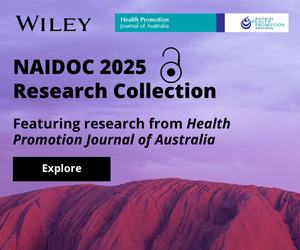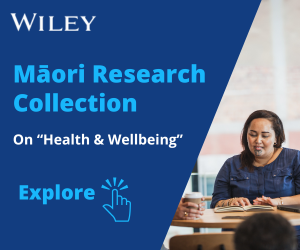Special Issue on Equity and Health Literacy
The Australian Health Promotion Association acknowledges the funding provided by the Northern Territory Primary Health Network (NTPHN) to collate and produce this special issue dedicated to equity and health literacy.
Professor James Smith
Editor-in-Chief, Health Promotion Journal of Australia
Explore
Equity and health literacy: Using emerging evidence to inform the development of the National Preventive Health Strategy
Can addressing food literacy across the life cycle improve the health of vulnerable populations? A case study approach
Public libraries as health literate multi‐purpose workspaces for improving health literacy
Engaging “hard-to-reach” men in health promotion using the OPHELIA principles: Participants' perspectives
Health literacy needs in weight management of women with Polycystic Ovary Syndrome
Experiences of health service literacy and access amongst Australian young adults from migrant backgrounds
The relationship of health literacy, wellbeing and religious beliefs in neglected and unequal contexts—Results of a survey study in central Afghanistan
Development and evaluation of a health literacy training program for allied health professionals: A pre‐post study assessing impact and implementation outcomes
Health literacy, digital health literacy and the implementation of digital health technologies in cancer care: the need for a strategic approach
Supporting patients to be involved in decisions about their health and care: Development of a best practice health literacy App for Australian adults living with Chronic Kidney Disease
A pilot study of adolescent health literacy research in Melbourne: Implementation and reflections
Healthier Together: Co-design of a culturally tailored childhood obesity community prevention program for Māori & Pacific Islander children and families
Aboriginal patient and interpreter perspectives on the delivery of culturally safe hospital‐based care
Using co‐design to develop a culturally responsive reproductive health learning resource for Aboriginal and Torres Strait Islander youth
Using social media in health literacy research: A promising example involving Facebook with young Aboriginal and Torres Strait Islander males from the Top End of the Northern Territory
Stay Strong: Aboriginal leaders deliver COVID‐19 health messages by Vicki Kerrigan, Anne Marie Lee, Anna P. Ralph, Paul D. Lawton
Development and evaluation of a health literacy training program for allied health professionals: A pre‐post study assessing impact and implementation outcomes by Danielle M. Muscat, Dragana Ceprnja, Kim Hobbs, Jodi‐Anne Gibson, Caron Blumenthal, Rula Milad, Chris Burns, Timothea Lau, Victoria Flood
Health literacy needs in weight management of women with Polycystic Ovary Syndrome by Siew Lim, Caroline A. Smith, Michael F. Costello, Freya MacMillan, Lisa Moran, Helena Teede, Carolyn Ee
Finding a pathway and making it strong: Learning from Yolŋu about meaningful health education in a remote Indigenous Australian context by Anne Lowell, Elaine Läwurrpa Maypilama, Rosemary Gundjarranbuy
Engaging “hard‐to‐reach” men in health promotion using the OPHELIA principles: Participants' perspectives by Leigh Kinsman, Jan Radford, Shandell Elmer, Kathryn Ogden, Sarah Randles, Alycia Jacob, Denise Delphin, Nettie Burr, Mick Goss
Health literacy, digital health literacy and the implementation of digital health technologies in cancer care: the need for a strategic approach by Emma Kemp, Joshua Trigg, Lisa Beatty, Chris Christensen, Haryana M. Dhillon, Anthony Maeder, Patricia A. H. Williams, Bogda Koczwara
Experiences of health service literacy and access amongst Australian young adults from migrant backgrounds by Gianina Raymundo, Jennifer Smith‐Merry, Justin McNab
‘Not everybody is an internet person’: Barriers for menopause‐related health literacy among immigrant women from the Horn of Africa nations by Karin A. Stanzel MPH, Karin Hammarberg PhD, Jane Fisher PhD
Reducing inequities among adult female migrants at higher risk for drowning in Australia: The value of swimming and water safety programs by Stacey M. Willcox‐Pidgeon, Richard C. Franklin, Sue Devine, Peter A. Leggat, Justin Scarr




-1613532904.png)


